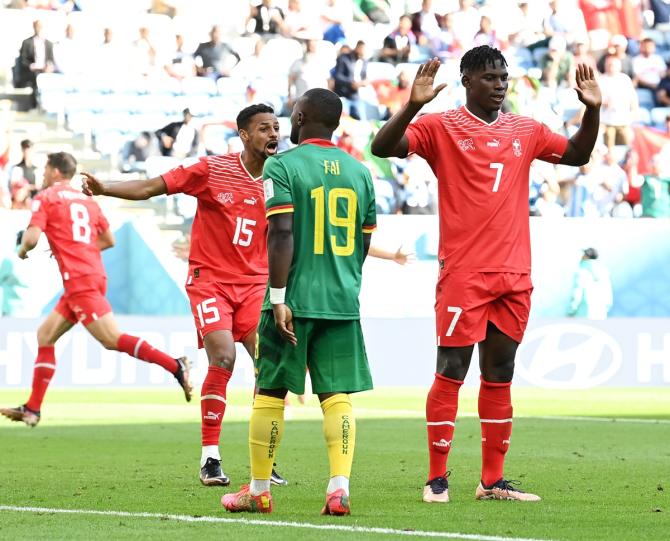More than 50 Africa-born or African-origin players are spread across 11 teams -- excluding sides from the continent -- that are part of the tournament in Qatar.

The first week of the Fifa World Cup offered an unusual sight during a Group G clash between Switzerland and Cameroon at the Al Janoub stadium, Qatar: Swiss striker Breel Embolo scored against the country of his birth, handing his team the lead in the 48th minute, and the eventual victory in the game, but the 25-year-old striker refused to celebrate the occasion and looked almost apologetic.
Then there's Timothy Weah, son of Liberian President and football legend George Weah. President Weah is the only African player to win the World, European and African Footballer of the Year awards, as well as the Ballon d'Or, and is often considered one of the greatest African players of the game.
The son, Timothy, was eligible to play for four countries and decided to go with the US, scoring a goal in his World Cup debut match against Wales. He became the first in eight years to score a goal for the US in the World Cup.

As the ongoing World Cup wrapped up one of the most entertaining group stages in a long time, the success stories for many, if not most, teams were scripted by migrant players such as Embolo and Weah, drawing the world media's attention to the tremendous flow of footballing talent across national boundaries, and the phenomenon's role in shaping the tournament.
Teams are awash with migrated talents in this edition of the World Cup. There's Turkey-born Aziz Behich playing for Australia, who made an astounding effort at the goal in their match against Argentina in the Super-16 tie.
Xherdan Shaqiri, who opened the scoring for Switzerland in their 3-2 rout of Serbia and thus became only the third footballer to have scored in each of the past three World Cups after Cristiano Ronaldo and Lionel Messi, was born in Yugoslavia.

There's a Frenchman in Die Mannschaft; a German plays for the Welsh side; Wales is buoyed by English talent; while England's leading striker is of Nigerian descent. Bukayo Saka has scored 3 goals in 3 matches for England (two against Iran, and one against Senegal).
Saka is not the only player of African descent playing for European, Latin American, or Asian teams. While an African team is yet to progress beyond the quarterfinals, African football has increasingly dominated the compositions of national teams across the world.
More than 50 Africa-born or African-origin players are spread across 11 teams -- excluding sides from the continent -- that are part of the tournament in Qatar.
Many star players in the line-ups for The Netherlands, Belgium, and Australia came to their adopted lands as refugees from Cameroon, Sudan, Ghana, Mali, Guinea Bissau, Angola, Nigeria, Congo, Ivory Coast, and other African nations.

France's World Cup triumph in 2018 rested heavily on the contribution of immigrants. Kylian Mbappe comes from a mixed Algerian and Cameroonian background, while the ancestors of N'Golo Kanté and Paul Pogba hail from Mali and Guinea, respectively.
The team composition became a cause for controversy when US-based South Africa-born comedian Trevor Noah declared on his late-night talk show, 'Africa won the World Cup!' The French ambassador to the United States, Gérard Araud, criticised Noah's remarks, claiming that France did not consider its citizens in terms of race, religion, or migration background.
Les Bleu has continued the practice with nearly a dozen of their current squad members tracing their origins to the African continent.
However, France is also the biggest exporter of talent, among individual countries. There are 37 players across nine countries, excluding the French team, who were born in France. Of these, 33 play for African nations.
On the other hand, even as African nations find their talent marching under foreign banners, they are also trying to reverse the talent drain by calling back migrants and naturalised foreign citizens of African descent for the success of their national teams.
The Moroccan football team is a perfect example. Their dream run in the group stages has been fuelled by immigrants, too -- Moroccan expats or their descendants, who have honed their talents in European leagues, as citizens of other countries.
Winger Hakim Ziyech, full-back Noussair Mazraoui, and midfielder Sofyan Amrabat were born in The Netherlands. Achraf Hakimi was born in Spain, while Captain Romain Saiss and winger Sofiane Boufal were born in France.

Only four out of the 32 teams have all players born in their own country -- Argentina, Brazil, Saudi Arabia, and South Korea.
A total of 136 footballers from the 28 other teams will not be representing countries of their birth -- that's 16 per cent of the total number of players in the World Cup.
It is the result of Fifa's recent change in rules that allow players to switch nationalities if they have played no more than three competitive matches for a country before turning 21 or represent a country of their family's origin -- a rule change that was championed by Morocco in 2019 and 2020.
The global conveyor belt of footballing talent is not divorced from the larger production-line of a globalised labour force. According to the UN 2022 World Migration Report, in 2022, there are around 281 million international migrants in the world, which makes up 3.6 per cent of the global population. In 2000, the figure was only 173 million.













 © 2025
© 2025